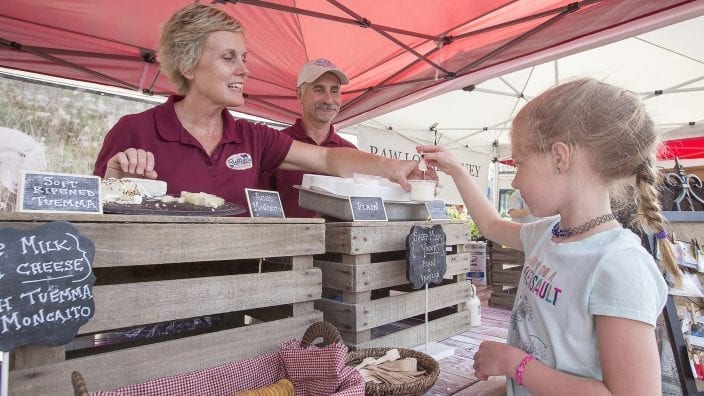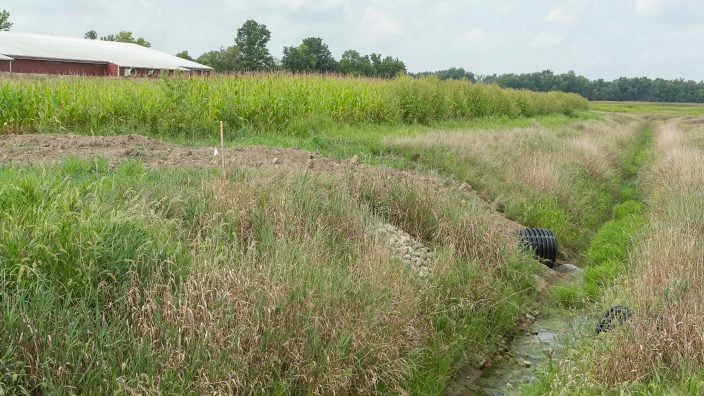Farmer’s Guide to Trucking Regulations available to Ohio Farm Bureau members
The guide includes a farm driver checklist, overview of state and federal regulations and exemptions, CDL qualifications and more.
Read More
Discussion topics include drainage management and Conservancy Districts in Ohio.
Sharing information on spring planting, first cutting hay, fertilizer and fuel prices rival discussions on primary elections, the national economy and international affairs. There’s plenty to talk about this time of year. If you want to “change the subject,” here’s a couple of discussion topics that could help you generate policy suggestions for your county Farm Bureau Policy Development Committee.
Petition ditches and subsurface tile systems are valuable drainage assets, providing resource management to efficiently plant, cultivate and harvest crops. Many of these systems are well within their second century of service. Given the amount of public and private investment in these assets, Ohio sits in one of the largest concentrations of drainage infrastructure in North America.
Community stakeholders are exploring needs for drainage. While some support less maintenance on petition ditches to allow the ground to return to a more natural state, others advocate that all public and private surface and subsurface structures be strictly maintained or improved to provide benefits across all fields, woodlots and developed properties. Where do you find the “balance” on care, maintenance and upkeep of Ohio’s public and private drainage infrastructure to benefit everyone?
Additional information/materials on this subject:
In response to the Great Flood of 1913, the Ohio General Assembly passed the Conservancy Act of Ohio. The act allowed the creation of conservancy districts to provide flood protection for communities within the state. There are over 20 Conservancy Districts, several with over a century of service. Some encompass watersheds at a multi-county levels measured in square miles. Some manage specific land holdings measured in acres, too.
Some community stakeholders have advocated that conservancy districts and their holdings should be protected and preserved much in the same way as a national park. Others continue to support maintenance of infrastructure and programs to primarily address flooding and water management. Where do we find the “balance?”
Additional information/materials on this subject:
Remember, you are not limited to these materials – Feel free to discuss additional topics and issues generated from the local newspaper, other publications and/or key events happening in your neighborhood.
Community Councils archives, essential forms
Remember, participants are not limited to these discussion topics and materials – Feel free to discuss additional topics and issues generated from the local newspaper, other publications and/or key events happening in your neighborhood.
Need some additional help? Contact your county Farm Bureau office for assistance.
Councils can access the council roster, meeting summary sheet and activity sheet forms online.
Remember to send council meeting forms and correspondence directly to the county Farm Bureau.
Many of Farm Bureau’s action plans started with conversation around a kitchen table, living room or front porch; lively discussion continues to develop using web applications, too.
To join a community council, contact the county Farm Bureau office.


The guide includes a farm driver checklist, overview of state and federal regulations and exemptions, CDL qualifications and more.
Read More


The emergency fuel waiver to allow the sale of summer gasoline blends containing 15% ethanol will lengthen the period during which Americans can continue buying E15 from June 1 to Sept. 15.
Read More

The Small-Scale Food Business Guide covers federal and state regulations for selling food products such as raw meat, dairy, eggs, baked goods, cottage foods, fruits and vegetables, honey and more.
Read More

New resources and technology are broadening the different types of sales tools and strategies available to farmers.
Read More

ODA will enroll 500,000 acres into the program for a two-week sign-up period, beginning April 22, 2024, through May 6, 2024. Contact local SWCD offices to apply.
Read More

Katie Share of Columbus has been named ExploreAg and Youth Development Specialist for Ohio Farm Bureau.
Read More

Mary Klopfenstein of Delphos has been named Young Ag Professional and Ag Literacy Program Specialist for Ohio Farm Bureau.
Read More

The plan has been updated to give sole proprietors access to more rate stability and a smart solution that offers potential savings on health care.
Read More

The American Farm Bureau Federation, in partnership with Farm Credit, is seeking entrepreneurs to apply online by June 15 for the 2025 Farm Bureau Ag Innovation Challenge.
Read More

Adele Flynn of Wellington has been elected treasurer of the Ohio Farm Bureau Federation and now holds the third highest elected office in Ohio’s largest and most influential farm organization.
Read More